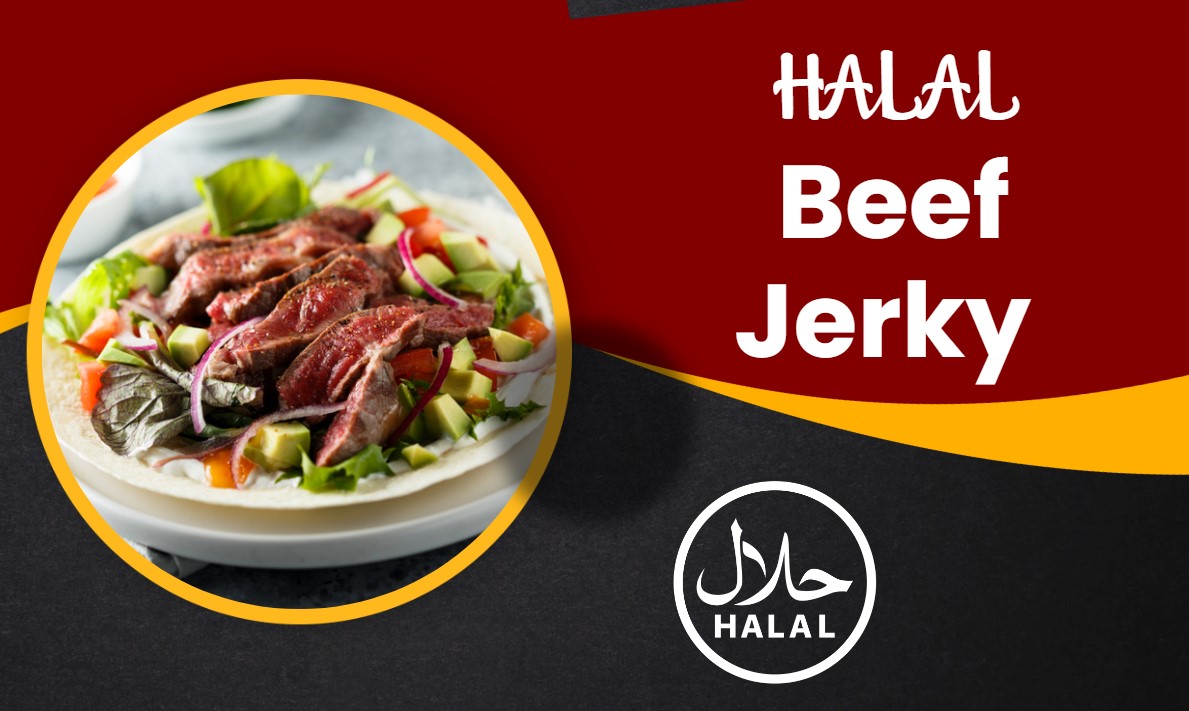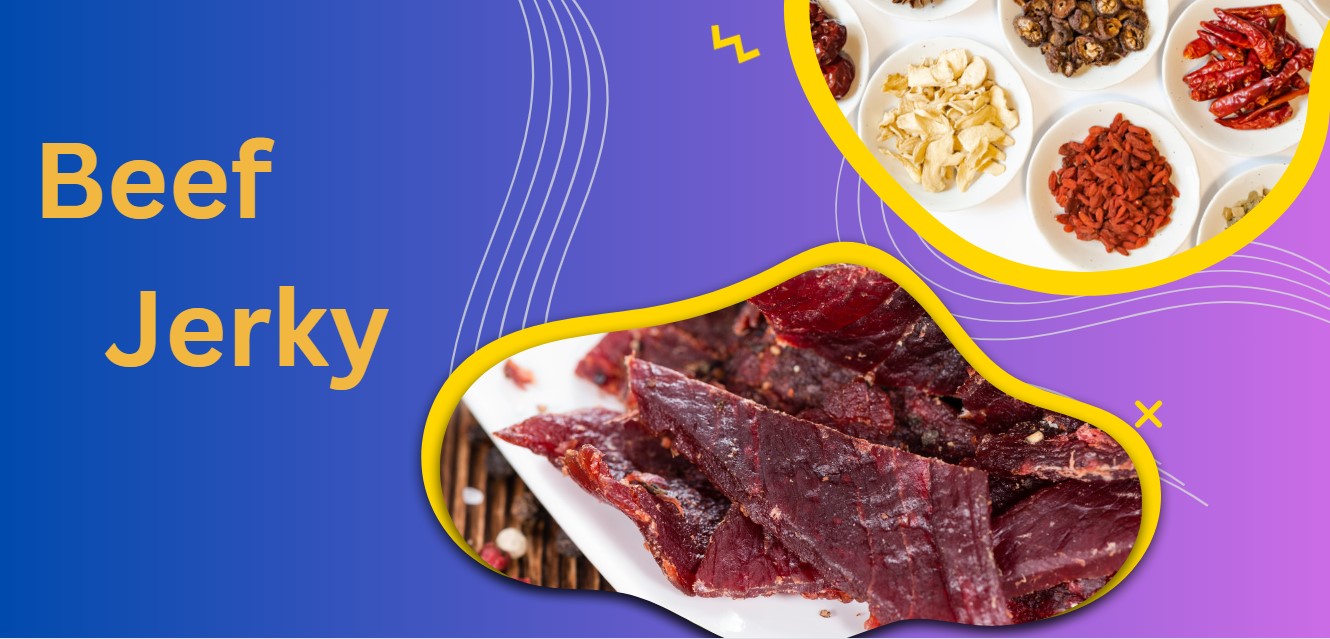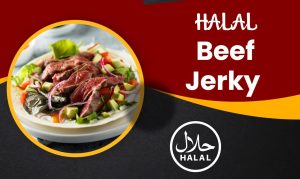Halal Beef Jerky: Exploring Authentic Flavors and Global Appeal

Halal beef jerky is a unique and popular snack that adheres to the dietary guidelines set by Islamic law. This flavorful and protein-packed treat has gained widespread recognition for its halal certification, making it suitable for consumption by Muslims worldwide. In this article, we will delve into the concept of halal beef jerky, assess its market, explore global demand, discuss an easy method of making it at home, examine its nutrition facts, highlight the benefits of incorporating it into your diet, and explore potential export opportunities.
What is Halal Beef Jerky?
Halal beef jerky is a variation of the traditional jerky snack, prepared in accordance with Islamic dietary laws. The term “halal” means permissible in Arabic, and when applied to food, it signifies that the product meets the religious requirements outlined in the Quran. In the case of halal beef jerky, this involves using halal-certified beef, employing specific preparation methods, and ensuring that all ingredients comply with halal standards.
Easy Method of Making Halal Beef Jerky
Making halal beef jerky at home can be a rewarding and straightforward process. Here’s a simple recipe that adheres to halal principles, ensuring a delicious and homemade halal beef jerky.
Ingredients:
1 pound of halal-certified lean beef (such as sirloin or round)
1/2 cup soy sauce (ensure it is halal-certified)
1/4 cup apple cider vinegar
2 tablespoons honey
1 teaspoon garlic powder
1 teaspoon onion powder
1 teaspoon ground black pepper
1 teaspoon smoked paprika
1 teaspoon red pepper flakes (adjust to taste for spiciness)
Instructions:
Prepare the Beef:
Trim any visible fat from the beef, as excess fat can hinder the drying process. Place the beef in the freezer for about 30 minutes. This makes it easier to slice thinly.
Slice the Beef:
Remove the partially frozen beef from the freezer. Slice the beef into thin strips, about 1/8 to 1/4 inch thick. Ensure uniformity for even drying.
Prepare the Marinade:
In a bowl, mix the soy sauce, apple cider vinegar, honey, garlic powder, onion powder, black pepper, smoked paprika, and red pepper flakes. This forms the marinade.
Marinate the Beef:
Place the sliced beef in a shallow dish or a resealable plastic bag. Pour the marinade over the beef, ensuring each strip is coated. Seal the dish or bag and refrigerate for at least 4 hours or overnight for the best flavor.
Preheat the Oven or Dehydrator:
Preheat your oven to the lowest temperature setting (around 170°F or 75°C). Alternatively, use a food dehydrator following the manufacturer’s instructions.
Drain and Pat Dry:
Remove the marinated beef from the refrigerator and drain excess marinade.Pat the beef strips dry with paper towels to remove surface moisture.
Arrange for Drying:
For the oven method, place a wire rack on a baking sheet. Arrange the beef strips on the rack, ensuring they don’t touch.For a dehydrator, place the beef strips directly on the dehydrator trays.
Drying Process:
Place the beef in the preheated oven or dehydrator. Oven drying may take around 3-4 hours, while a dehydrator might take 4-6 hours. Rotate the beef strips occasionally for even drying.
Check for Doneness:
Beef jerky is ready when it’s firm and dry, but still pliable. It should not be brittle.If using an oven, crack the oven door slightly during the drying process to allow moisture to escape.
Cool and Store:
Allow the halal beef jerky to cool completely. Store in an airtight container or zip-top bag. Refrigerate for longer shelf life.

Nutrition Facts about Halal Beef Jerky
The nutrition facts of halal beef jerky can vary slightly depending on the specific recipe and preparation methods. However, in general, halal beef jerky is a protein-rich snack with additional nutrients. Here’s a breakdown of the typical nutritional content for a serving of halal beef jerky (approximately 1 ounce or 28 grams).
Protein: Halal beef jerky is a high-protein snack, providing around 10-15 grams of protein per serving. Protein is essential for muscle repair and development.
Fat: The fat content in halal beef jerky is relatively low, typically ranging from 1 to 5 grams per serving. The use of lean cuts of beef contributes to its overall lower fat content.
Carbohydrates: The carbohydrate content is minimal, usually ranging from 1 to 5 grams per serving. This makes halal beef jerky a low-carb snack option.
Sodium: One potential concern with beef jerky is its sodium content. Due to the marinating and drying process, halal beef jerky can be relatively high in sodium, with around 300-600 milligrams per serving. It’s essential to be mindful of sodium intake, especially for individuals with specific dietary restrictions or health concerns.
Iron: Beef is a good source of iron, and halal beef jerky retains this nutrient. Iron is vital for oxygen transport in the blood and overall energy metabolism.
Zinc: Beef is also a source of zinc, contributing to immune function and wound healing. Halal beef jerky contains a moderate amount of zinc.
Balanced Diet: While halal beef jerky can be a nutritious snack, it’s essential to incorporate it into a balanced diet with a variety of food sources.
As with any snack, moderation is key. While halal beef jerky offers a convenient and protein-packed option, it’s important to consider overall dietary choices and individual health needs. Always check the nutritional information on store-bought products and adjust homemade recipes to meet specific dietary preferences and requirements.
Benefits of Halal Beef Jerky
Halal beef jerky offers several benefits, making it a popular and nutritious snack choice for a diverse range of consumers. Here are some of the key advantages associated with consuming halal beef jerky-
High Protein Content:
One of the primary advantages of halal beef jerky is its high protein content. Protein is crucial for muscle repair and development, making this snack an excellent choice for individuals leading active lifestyles or engaging in regular physical activity.
Convenience and Portability:
Halal beef jerky is a convenient and portable snack. Its long shelf life and resistance to spoilage make it an ideal option for on-the-go individuals, outdoor activities, or as a quick and easy protein source during travel.
Low in Fat:
Typically made from lean cuts of beef, halal beef jerky tends to be low in fat. This makes it a suitable snack for those looking to manage their fat intake without compromising on flavor or nutrition.
Rich in Essential Nutrients:
Halal beef jerky contains essential nutrients such as iron and zinc, both of which play vital roles in supporting various bodily functions. Iron is essential for oxygen transport in the blood, while zinc contributes to immune function and wound healing.
Low Carbohydrate Option:
For individuals following low-carbohydrate diets, halal beef jerky is a favorable snack choice. It provides protein without a significant carbohydrate load, making it suitable for those managing their carb intake.
Long Shelf Life:
The dehydration process used to make beef jerky contributes to its extended shelf life. This makes it a practical option for stocking up on snacks without the concern of rapid spoilage.
Versatile Flavor Options:
Halal beef jerky comes in various flavors, allowing consumers to choose options that suit their taste preferences. From traditional smoked varieties to innovative and bold flavor combinations, there’s a diverse range to cater to different palates.
Satiety and Weight Management:
The combination of protein and low fat in halal beef jerky can contribute to a feeling of fullness or satiety. This can be beneficial for individuals looking to manage their weight by controlling snacking and overall calorie intake.
Halal Certification:
For individuals adhering to Islamic dietary principles, the halal certification of beef jerky ensures that the product meets the religious requirements outlined in the Quran. This adds an extra layer of assurance and enables Muslim consumers to enjoy a convenient and tasty snack without compromising on their dietary beliefs.
Alternative to Processed Snacks:
Halal beef jerky serves as a healthier alternative to many processed snacks that may be high in added sugars, artificial additives, and preservatives. Choosing a natural and minimally processed snack can contribute to overall better dietary choices.
Incorporating halal beef jerky into a balanced diet can offer a range of nutritional benefits, making it a versatile and enjoyable snack option for various lifestyles and dietary preferences.
Market Assessment of Halal Beef Jerky
In recent years, the market for halal products has experienced significant growth, reflecting the increasing demand for food that aligns with Islamic dietary principles. Halal beef jerky has carved a niche for itself in the snack industry, with both Muslim and non-Muslim consumers appreciating its high-quality ingredients and unique flavors. The market has witnessed the emergence of various brands specializing in halal snacks, including beef jerky, catering to a diverse consumer base. The global halal meat market attained a significant value of USD 202 billion in 2021 and is projected to display a robust growth trajectory with an estimated value of USD 375.05 billion by 2030. The market is expected to maintain a steady Compound Annual Growth Rate (CAGR) of 7.1% from 2022 to 2030.
Export Opportunities of Halal Beef Jerky
In recent years, the export potential of halal beef jerky has become increasingly evident as the demand for halal-certified products continues to surge on the global stage. The unique blend of flavors, adherence to religious dietary principles, and a focus on high-quality ingredients make halal beef jerky a promising product for international markets.
Rising Global Demand for Halal Products:
The global market for halal products has experienced significant growth, reflecting an increased awareness of halal dietary practices and a desire for ethically produced food items. As the demand for halal-certified products continues to rise, halal beef jerky emerges as a prime candidate for export due to its appeal to both Muslim and non-Muslim consumers worldwide.
Inclusive Nature of Halal Beef Jerky:
Halal beef jerky has proven to be inclusive, transcending cultural and religious boundaries. Its diverse range of flavors caters to a broad spectrum of tastes, making it an attractive option for consumers with varied preferences. This inclusivity positions halal beef jerky as a versatile snack with global market appeal.
Recognition in Non-Muslim Markets:
Beyond traditional Muslim-majority countries, halal beef jerky has gained recognition in non-Muslim markets. The emphasis on high-quality ingredients, ethical production methods, and unique flavors has led to its acceptance among consumers seeking premium snacks.
E-commerce and Online Marketplaces:
The advent of e-commerce has played a pivotal role in the export potential of halal beef jerky. Online marketplaces provide a platform for businesses to reach consumers globally, allowing for easy access to halal-certified products.
Strategic Partnerships and Certifications:
Establishing strategic partnerships and obtaining internationally recognized certifications are crucial steps for businesses looking to export halal beef jerky. Collaborations with distributors, retailers, and online platforms can enhance the product’s visibility and accessibility in various regions.
Customization for Regional Preferences:
A key aspect of successful export is the ability to adapt to regional preferences. Halal beef jerky businesses can explore customization of flavors and packaging to cater to the specific tastes and cultural nuances of different markets. This adaptability enhances the product’s competitiveness in diverse international landscapes.
Cultural and Culinary Tourism:
The export potential of halal beef jerky is further amplified by the rise of cultural and culinary tourism. As travelers seek familiar and appealing snacks, halal beef jerky can become a favored choice, contributing to its recognition and demand in diverse regions.
The export opportunities for halal beef jerky are significant and growing. Businesses that strategically position themselves, focus on quality and adherence to halal standards and embrace the diverse tastes of global consumers are poised to tap into the immense potential of the international market.
Halal beef jerky represents more than just a snack; it symbolizes the intersection of cultural, religious, and dietary preferences in the culinary world. With a growing market, widespread demand, and export potential, the future looks promising for this unique and flavorful halal-certified treat. Whether enjoyed as a quick snack or incorporated into a balanced diet, halal beef jerky stands as a testament to the diverse and inclusive nature of the global food industry.





